Transcriber’s Note:
This etext was produced from Galaxy Science Fiction, October 1955. Extensive research did not uncover any evidence that the U.S. copyright on this publication was renewed.
The Game of Rat and Dragon
By CORDWAINER SMITH
Only partners could fight this deadliest of wars—and the one way to dissolve the partnership was to be personally dissolved!
Illustrated by HUNTER


THE TABLE
inlighting is a hell of a way to earn a living. Underhill was furious as he closed the door behind himself. It didn’t make much sense to wear a uniform and look like a soldier if people didn’t appreciate what you did.
He sat down in his chair, laid his head back in the headrest and pulled the helmet down over his forehead.
As he waited for the pin-set to warm up, he remembered the girl in the outer corridor. She had looked at it, then looked at him scornfully.
“Meow.” That was all she had said. Yet it had cut him like a knife.
What did she think he was—a fool, a loafer, a uniformed nonentity? Didn’t she know that for every half hour of pinlighting, he got a minimum of two months’ recuperation in the hospital?
By now the set was warm. He felt the squares of space around him, sensed himself at the middle of an immense grid, a cubic grid, full of nothing. Out in that nothingness, he could sense the hollow aching horror of space itself and could feel the terrible anxiety which his mind encountered whenever it met the faintest trace of inert dust.
As he relaxed, the comforting solidity of the Sun, the clock-work of the familiar planets and the Moon rang in on him. Our own solar system was as charming and as simple as an ancient cuckoo clock filled with familiar ticking and with reassuring noises. The odd little moons of Mars swung around their planet like frantic mice, yet their regularity was itself an assurance that all was well. Far above the plane of the ecliptic, he could feel half a ton of dust more or less drifting outside the lanes of human travel.
Here there was nothing to fight, nothing to challenge the mind, to tear the living soul out of a body with its roots dripping in effluvium as tangible as blood.
Nothing ever moved in on the Solar System. He could wear the pin-set forever and be nothing more than a sort of telepathic astronomer, a man who could feel the hot, warm protection of the Sun throbbing and burning against his living mind.
“Same old ticking world,” said Underhill. “Nothing to report. No wonder they didn’t develop the pin-set until they began to planoform. Down here with the hot Sun around us, it feels so good and so quiet. You can feel everything spinning and turning. It’s nice and sharp and compact. It’s sort of like sitting around home.”
Woodley grunted. He was not much given to flights of fantasy.
Undeterred, Underhill went on, “It must have been pretty good to have been an Ancient Man. I wonder why they burned up their world with war. They didn’t have to planoform. They didn’t have to go out to earn their livings among the stars. They didn’t have to dodge the Rats or play the Game. They couldn’t have invented pinlighting because they didn’t have any need of it, did they, Woodley?”
Woodley grunted, “Uh-huh.” Woodley was twenty-six years old and due to retire in one more year. He already had a farm picked out. He had gotten through ten years of hard work pinlighting with the best of them. He had kept his sanity by not thinking very much about his job, meeting the strains of the task whenever he had to meet them and thinking nothing more about his duties until the next emergency arose.
Woodley never made a point of getting popular among the Partners. None of the Partners liked him very much. Some of them even resented him. He was suspected of thinking ugly thoughts of the Partners on occasion, but since none of the Partners ever thought a complaint in articulate form, the other pinlighters and the Chiefs of the Instrumentality left him alone.
Underhill was still full of the wonder of their job. Happily he babbled on, “What does happen to us when we planoform? Do you think it’s sort of like dying? Did you ever see anybody who had his soul pulled out?”
“Pulling souls is just a way of talking about it,” said Woodley. “After all these years, nobody knows whether we have souls or not.”
“But I saw one once. I saw what Dogwood looked like when he came apart. There was something funny. It looked wet and sort of sticky as if it were bleeding and it went out of him—and you know what they did to Dogwood? They took him away, up in that part of the hospital where you and I never go—way up at the top part where the others are, where the others always have to go if they are alive after the Rats of the Up-and-Out have gotten them.”
Woodley sat down and lit an ancient pipe. He was burning something called tobacco in it. It was a dirty sort of habit, but it made him look very dashing and adventurous.
“Look here, youngster. You don’t have to worry about that stuff. Pinlighting is getting better all the time. The Partners are getting better. I’ve seen them pinlight two Rats forty-six million miles apart in one and a half milliseconds. As long as people had to try to work the pin-sets themselves, there was always the chance that with a minimum of four hundred milliseconds for the human mind to set a pinlight, we wouldn’t light the Rats up fast enough to protect our planoforming ships. The Partners have changed all that. Once they get going, they’re faster than Rats. And they always will be. I know it’s not easy, letting a Partner share your mind—”
“It’s not easy for them, either,” said Underhill.
“Don’t worry about them. They’re not human. Let them take care of themselves. I’ve seen more pinlighters go crazy from monkeying around with Partners than I have ever seen caught by the Rats. How many do you actually know of them that got grabbed by Rats?”
Planoforming was sort of funny. It felt like like—
Like nothing much.
Like the twinge of a mild electric shock.
Like the ache of a sore tooth bitten on for the first time.
Like a slightly painful flash of light against the eyes.
Yet in that time, a forty-thousand-ton ship lifting free above Earth disappeared somehow or other into two dimensions and appeared half a light-year or fifty light-years off.
At one moment, he would be sitting in the Fighting Room, the pin-set ready and the familiar Solar System ticking around inside his head. For a second or a year (he could never tell how long it really was, subjectively), the funny little flash went through him and then he was loose in the Up-and-Out, the terrible open spaces between the stars, where the stars themselves felt like pimples on his telepathic mind and the planets were too far away to be sensed or read.
Somewhere in this outer space, a gruesome death awaited, death and horror of a kind which Man had never encountered until he reached out for inter-stellar space itself. Apparently the light of the suns kept the Dragons away.
But to the telepaths, they were Dragons.
In the fraction of a second between the telepaths’ awareness of a hostile something out in the black, hollow nothingness of space and the impact of a ferocious, ruinous psychic blow against all living things within the ship, the telepaths had sensed entities something like the Dragons of ancient human lore, beasts more clever than beasts, demons more tangible than demons, hungry vortices of aliveness and hate compounded by unknown means out of the thin tenuous matter between the stars.
It took a surviving ship to bring back the news—a ship in which, by sheer chance, a telepath had a light beam ready, turning it out at the innocent dust so that, within the panorama of his mind, the Dragon dissolved into nothing at all and the other passengers, themselves non-telepathic, went about their way not realizing that their own immediate deaths had been averted.
From then on, it was easy—almost.
Light broke up the Dragons, allowed the ships to reform three-dimensionally, skip, skip, skip, as they moved from star to star.
The odds suddenly moved down from a hundred to one against mankind to sixty to forty in mankind’s favor.
This was not enough. The telepaths were trained to become ultrasensitive, trained to become aware of the Dragons in less than a millisecond.
But it was found that the Dragons could move a million miles in just under two milliseconds and that this was not enough for the human mind to activate the light beams.
Attempts had been made to sheath the ships in light at all times.
This defense wore out.
As mankind learned about the Dragons, so too, apparently, the Dragons learned about mankind. Somehow they flattened their own bulk and came in on extremely flat trajectories very quickly.
Intense light was needed, light of sunlike intensity. This could be provided only by light bombs. Pinlighting came into existence.
Pinlighting consisted of the detonation of ultra-vivid miniature photonuclear bombs, which converted a few ounces of a magnesium isotope into pure visible radiance.

The odds kept coming down in mankind’s favor, yet ships were being lost.
It became so bad that people didn’t even want to find the ships because the rescuers knew what they would see. It was sad to bring back to Earth three hundred bodies ready for burial and two hundred or three hundred lunatics, damaged beyond repair, to be wakened, and fed, and cleaned, and put to sleep, wakened and fed again until their lives were ended.
Then came the Partners.
Man and Partner could do together what Man could not do alone. Men had the intellect. Partners had the speed.
The Partners rode their tiny craft, no larger than footballs, outside the spaceships. They planoformed with the ships. They rode beside them in their six-pound craft ready to attack.
The tiny ships of the Partners were swift. Each carried a dozen pinlights, bombs no bigger than thimbles.
The pinlighters threw the Partners—quite literally threw—by means of mind-to-firing relays direct at the Dragons.
What seemed to be Dragons to the human mind appeared in the form of gigantic Rats in the minds of the Partners.
Out in the pitiless nothingness of space, the Partners’ minds responded to an instinct as old as life. The Partners attacked, striking with a speed faster than Man’s, going from attack to attack until the Rats or themselves were destroyed. Almost all the time, it was the Partners who won.
With the safety of the inter-stellar skip, skip, skip of the ships, commerce increased immensely, the population of all the colonies went up, and the demand for trained Partners increased.
Underhill and Woodley were a part of the third generation of pinlighters and yet, to them, it seemed as though their craft had endured forever.

Gearing space into minds by means of the pin-set, adding the Partners to those minds, keying up the mind for the tension of a fight on which all depended—this was more than human synapses could stand for long. Underhill needed his two months’ rest after half an hour of fighting. Woodley needed his retirement after ten years of service. They were young. They were good. But they had limitations.
So much depended on the choice of Partners, so much on the sheer luck of who drew whom.
THE SHUFFLE
Father Moontree was a red-faced man of forty-five who had lived the peaceful life of a farmer until he reached his fortieth year. Only then, belatedly, did the authorities find he was telepathic and agree to let him late in life enter upon the career of pinlighter. He did well at it, but he was fantastically old for this kind of business.
Father Moontree looked at the glum Woodley and the musing Underhill. “How’re the youngsters today? Ready for a good fight?”
“Father always wants a fight,” giggled the little girl named West. She was such a little little girl. Her giggle was high and childish. She looked like the last person in the world one would expect to find in the rough, sharp dueling of pinlighting.
Underhill had been amused one time when he found one of the most sluggish of the Partners coming away happy from contact with the mind of the girl named West.
Usually the Partners didn’t care much about the human minds with which they were paired for the journey. The Partners seemed to take the attitude that human minds were complex and fouled up beyond belief, anyhow. No Partner ever questioned the superiority of the human mind, though very few of the Partners were much impressed by that superiority.
The Partners liked people. They were willing to fight with them. They were even willing to die for them. But when a Partner liked an individual the way, for example, that Captain Wow or the Lady May liked Underhill, the liking had nothing to do with intellect. It was a matter of temperament, of feel.
Underhill knew perfectly well that Captain Wow regarded his, Underhill’s, brains as silly. What Captain Wow liked was Underhill’s friendly emotional structure, the cheerfulness and glint of wicked amusement that shot through Underhill’s unconscious thought patterns, and the gaiety with which Underhill faced danger. The words, the history books, the ideas, the science—Underhill could sense all that in his own mind, reflected back from Captain Wow’s mind, as so much rubbish.
Miss West looked at Underhill. “I bet you’ve put stickum on the stones.”
“I did not!”
Underhill felt his ears grow red with embarrassment. During his novitiate, he had tried to cheat in the lottery because he got particularly fond of a special Partner, a lovely young mother named Murr. It was so much easier to operate with Murr and she was so affectionate toward him that he forgot pinlighting was hard work and that he was not instructed to have a good time with his Partner. They were both designed and prepared to go into deadly battle together.
One cheating had been enough. They had found him out and he had been laughed at for years.
Father Moontree picked up the imitation-leather cup and shook the stone dice which assigned them their Partners for the trip. By senior rights, he took first draw.
e grimaced. He had drawn a greedy old character, a tough old male whose mind was full of slobbering thoughts of food, veritable oceans full of half-spoiled fish. Father Moontree had once said that he burped cod liver oil for weeks after drawing that particular glutton, so strongly had the telepathic image of fish impressed itself upon his mind. Yet the glutton was a glutton for danger as well as for fish. He had killed sixty-three Dragons, more than any other Partner in the service, and was quite literally worth his weight in gold.
The little girl West came next. She drew Captain Wow. When she saw who it was, she smiled.
“I like him,” she said. “He’s such fun to fight with. He feels so nice and cuddly in my mind.”
“Cuddly, hell,” said Woodley. “I’ve been in his mind, too. It’s the most leering mind in this ship, bar none.”
“Nasty man,” said the little girl. She said it declaratively, without reproach.
Underhill, looking at her, shivered.
He didn’t see how she could take Captain Wow so calmly. Captain Wow’s mind did leer. When Captain Wow got excited in the middle of a battle, confused images of Dragons, deadly Rats, luscious beds, the smell of fish, and the shock of space all scrambled together in his mind as he and Captain Wow, their consciousnesses linked together through the pin-set, became a fantastic composite of human being and Persian cat.
That’s the trouble with working with cats, thought Underhill. It’s a pity that nothing else anywhere will serve as Partner. Cats were all right once you got in touch with them telepathically. They were smart enough to meet the needs of the fight, but their motives and desires were certainly different from those of humans.
They were companionable enough as long as you thought tangible images at them, but their minds just closed up and went to sleep when you recited Shakespeare or Colegrove, or if you tried to tell them what space was.
It was sort of funny realizing that the Partners who were so grim and mature out here in space were the same cute little animals that people had used as pets for thousands of years back on Earth. He had embarrassed himself more than once while on the ground saluting perfectly ordinary non-telepathic cats because he had forgotten for the moment that they were not Partners.
He picked up the cup and shook out his stone dice.
He was lucky—he drew the Lady May.
When he had first come into contact with her mind, he was astonished at its clarity. With her he remembered her kittenhood. He remembered every mating experience she had ever had. He saw in a half-recognizable gallery all the other pinlighters with whom she had been paired for the fight. And he saw himself radiant, cheerful and desirable.
He even thought he caught the edge of a longing—
A very flattering and yearning thought: What a pity he is not a cat.
Woodley picked up the last stone. He drew what he deserved—a sullen, scared old tomcat with none of the verve of Captain Wow. Woodley’s Partner was the most animal of all the cats on the ship, a low, brutish type with a dull mind. Even telepathy had not refined his character. His ears were half chewed off from the first fights in which he had engaged.
He was a serviceable fighter, nothing more.
Woodley grunted.
Underhill glanced at him oddly. Didn’t Woodley ever do anything but grunt?
Father Moontree looked at the other three. “You might as well get your Partners now. I’ll let the Scanner know we’re ready to go into the Up-and-Out.”
THE DEAL
He talked to her in human speech, even though speech meant nothing to a cat when the pin-set was not on.
“It’s a damn shame, sending a sweet little thing like you whirling around in the coldness of nothing to hunt for Rats that are bigger and deadlier than all of us put together. You didn’t ask for this kind of fight, did you?”
For answer, she licked his hand, purred, tickled his cheek with her long fluffy tail, turned around and faced him, golden eyes shining.
For a moment, they stared at each other, man squatting, cat standing erect on her hind legs, front claws digging into his knee. Human eyes and cat eyes looked across an immensity which no words could meet, but which affection spanned in a single glance.
“Time to get in,” he said.
She walked docilely into her spheroid carrier. She climbed in. He saw to it that her miniature pin-set rested firmly and comfortably against the base of her brain. He made sure that her claws were padded so that she could not tear herself in the excitement of battle.
Softly he said to her, “Ready?”
For answer, she preened her back as much as her harness would permit and purred softly within the confines of the frame that held her.
He slapped down the lid and watched the sealant ooze around the seam. For a few hours, she was welded into her projectile until a workman with a short cutting arc would remove her after she had done her duty.
Once again he flung the switch.
He sat in a small room, small, small, warm, warm, the bodies of the other three people moving close around him, the tangible lights in the ceiling bright and heavy against his closed eyelids.
As the pin-set warmed, the room fell away. The other people ceased to be people and became small glowing heaps of fire, embers, dark red fire, with the consciousness of life burning like old red coals in a country fireplace.
As the pin-set warmed a little more, he felt Earth just below him, felt the ship slipping away, felt the turning Moon as it swung on the far side of the world, felt the planets and the hot, clear goodness of the Sun which kept the Dragons so far from mankind’s native ground.
Finally, he reached complete awareness.
He was telepathically alive to a range of millions of miles. He felt the dust which he had noticed earlier high above the ecliptic. With a thrill of warmth and tenderness, he felt the consciousness of the Lady May pouring over into his own. Her consciousness was as gentle and clear and yet sharp to the taste of his mind as if it were scented oil. It felt relaxing and reassuring. He could sense her welcome of him. It was scarcely a thought, just a raw emotion of greeting.
At last they were one again.
In a tiny remote corner of his mind, as tiny as the smallest toy he had ever seen in his childhood, he was still aware of the room and the ship, and of Father Moontree picking up a telephone and speaking to a Scanner captain in charge of the ship.
His telepathic mind caught the idea long before his ears could frame the words. The actual sound followed the idea the way that thunder on an ocean beach follows the lightning inward from far out over the seas.
“The Fighting Room is ready. Clear to planoform, sir.”
THE PLAY
He was braced for the quick vinegar thrill of planoforming, but he caught her report of it before his own nerves could register what happened.
Earth had fallen so far away that he groped for several milliseconds before he found the Sun in the upper rear right-hand corner of his telepathic mind.
That was a good jump, he thought. This way we’ll get there in four or five skips.
A few hundred miles outside the ship, the Lady May thought back at him, “O warm, O generous, O gigantic man! O brave, O friendly, O tender and huge Partner! O wonderful with you, with you so good, good, good, warm, warm, now to fight, now to go, good with you….”
He knew that she was not thinking words, that his mind took the clear amiable babble of her cat intellect and translated it into images which his own thinking could record and understand.
Neither one of them was absorbed in the game of mutual greetings. He reached out far beyond her range of perception to see if there was anything near the ship. It was funny how it was possible to do two things at once. He could scan space with his pin-set mind and yet at the same time catch a vagrant thought of hers, a lovely, affectionate thought about a son who had had a golden face and a chest covered with soft, incredibly downy white fur.
While he was still searching, he caught the warning from her.
We jump again!
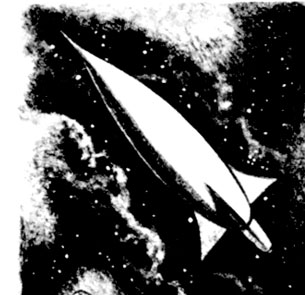
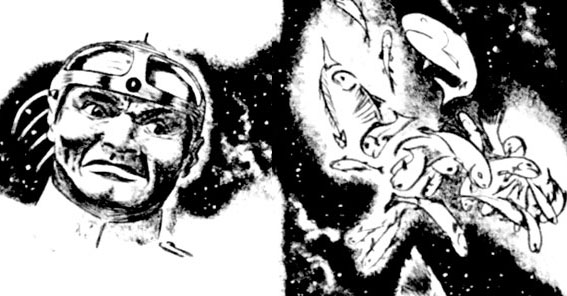
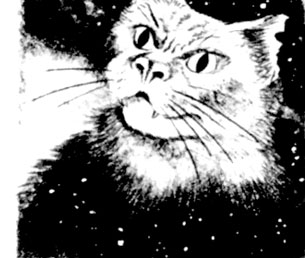
And so they had. The ship had moved to a second planoform. The stars were different. The Sun was immeasurably far behind. Even the nearest stars were barely in contact. This was good Dragon country, this open, nasty, hollow kind of space. He reached farther, faster, sensing and looking for danger, ready to fling the Lady May at danger wherever he found it.
Terror blazed up in his mind, so sharp, so clear, that it came through as a physical wrench.
The little girl named West had found something—something immense, long, black, sharp, greedy, horrific. She flung Captain Wow at it.
Underhill tried to keep his own mind clear. “Watch out!” he shouted telepathically at the others, trying to move the Lady May around.
At one corner of the battle, he felt the lustful rage of Captain Wow as the big Persian tomcat detonated lights while he approached the streak of dust which threatened the ship and the people within.
The lights scored near-misses.
The dust flattened itself, changing from the shape of a sting-ray into the shape of a spear.
Not three milliseconds had elapsed.
Father Moontree was talking human words and was saying in a voice that moved like cold molasses out of a heavy jar, “C-A-P-T-A-I-N.” Underhill knew that the sentence was going to be “Captain, move fast!”
The battle would be fought and finished before Father Moontree got through talking.
Now, fractions of a millisecond later, the Lady May was directly in line.
Here was where the skill and speed of the Partners came in. She could react faster than he. She could see the threat as an immense Rat coming direct at her.
She could fire the light-bombs with a discrimination which he might miss.
He was connected with her mind, but he could not follow it.
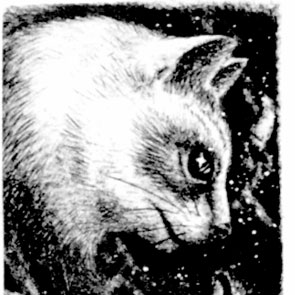
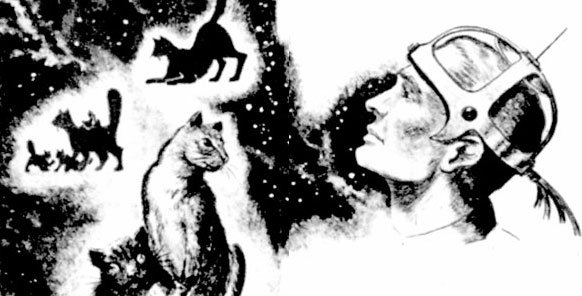
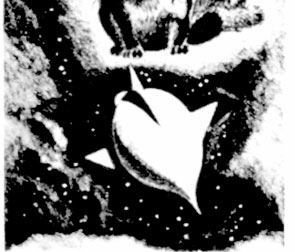
His consciousness absorbed the tearing wound inflicted by the alien enemy. It was like no wound on Earth—raw, crazy pain which started like a burn at his navel. He began to writhe in his chair.
Actually he had not yet had time to move a muscle when the Lady May struck back at their enemy.
Five evenly spaced photonuclear bombs blazed out across a hundred thousand miles.
The pain in his mind and body vanished.
He felt a moment of fierce, terrible, feral elation running through the mind of the Lady May as she finished her kill. It was always disappointing to the cats to find out that their enemies whom they sensed as gigantic space Rats disappeared at the moment of destruction.
Then he felt her hurt, the pain and the fear that swept over both of them as the battle, quicker than the movement of an eyelid, had come and gone. In the same instant, there came the sharp and acid twinge of planoform.
Once more the ship went skip.
He could hear Woodley thinking at him. “You don’t have to bother much. This old son of a gun and I will take over for a while.”
Twice again the twinge, the skip.
He had no idea where he was until the lights of the Caledonia space board shone below.
With a weariness that lay almost beyond the limits of thought, he threw his mind back into rapport with the pin-set, fixing the Lady May’s projectile gently and neatly in its launching tube.
She was half dead with fatigue, but he could feel the beat of her heart, could listen to her panting, and he grasped the grateful edge of a thanks reaching from her mind to his.
THE SCORE
The doctor was friendly but firm. “You actually got touched by that Dragon. That’s as close a shave as I’ve ever seen. It’s all so quick that it’ll be a long time before we know what happened scientifically, but I suppose you’d be ready for the insane asylum now if the contact had lasted several tenths of a millisecond longer. What kind of cat did you have out in front of you?”
Underhill felt the words coming out of him slowly. Words were such a lot of trouble compared with the speed and the joy of thinking, fast and sharp and clear, mind to mind! But words were all that could reach ordinary people like this doctor.
His mouth moved heavily as he articulated words, “Don’t call our Partners cats. The right thing to call them is Partners. They fight for us in a team. You ought to know we call them Partners, not cats. How is mine?”
“I don’t know,” said the doctor contritely. “We’ll find out for you. Meanwhile, old man, you take it easy. There’s nothing but rest that can help you. Can you make yourself sleep, or would you like us to give you some kind of sedative?”
“I can sleep,” said Underhill. “I just want to know about the Lady May.”
The nurse joined in. She was a little antagonistic. “Don’t you want to know about the other people?”
“They’re okay,” said Underhill. “I knew that before I came in here.”
He stretched his arms and sighed and grinned at them. He could see they were relaxing and were beginning to treat him as a person instead of a patient.
“I’m all right,” he said. “Just let me know when I can go see my Partner.”
A new thought struck him. He looked wildly at the doctor. “They didn’t send her off with the ship, did they?”
“I’ll find out right away,” said the doctor. He gave Underhill a reassuring squeeze of the shoulder and left the room.
The nurse took a napkin off a goblet of chilled fruit juice.
Suddenly she swung around on him.
“You pinlighters! You and your damn cats!”
Just as she stamped out, he burst into her mind. He saw himself a radiant hero, clad in his smooth suede uniform, the pin-set crown shining like ancient royal jewels around his head. He saw his own face, handsome and masculine, shining out of her mind. He saw himself very far away and he saw himself as she hated him.
She hated him in the secrecy of her own mind. She hated him because he was—she thought—proud, and strange, and rich, better and more beautiful than people like her.
He cut off the sight of her mind and, as he buried his face in the pillow, he caught an image of the Lady May.
“She is a cat,” he thought. “That’s all she is—a cat!”
But that was not how his mind saw her—quick beyond all dreams of speed, sharp, clever, unbelievably graceful, beautiful, wordless and undemanding.
Where would he ever find a woman who could compare with her?
—CORDWAINER SMITH
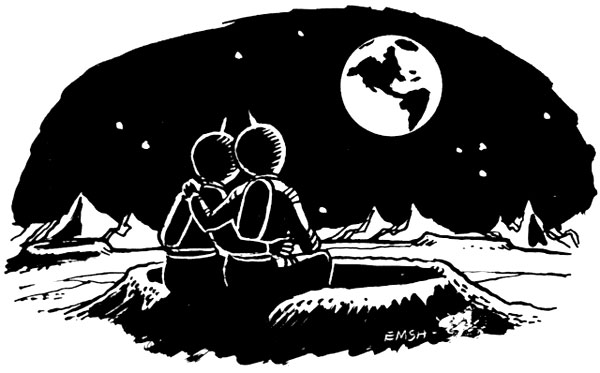
Candela Citations
- The Game of Rat and Dragon. Authored by: Cordwainer Smith. Provided by: Project Gutenberg. Located at: https://www.gutenberg.org/files/29614/29614-h/29614-h.htm. Project: Space Mythos: Science Fiction. License: Public Domain: No Known Copyright